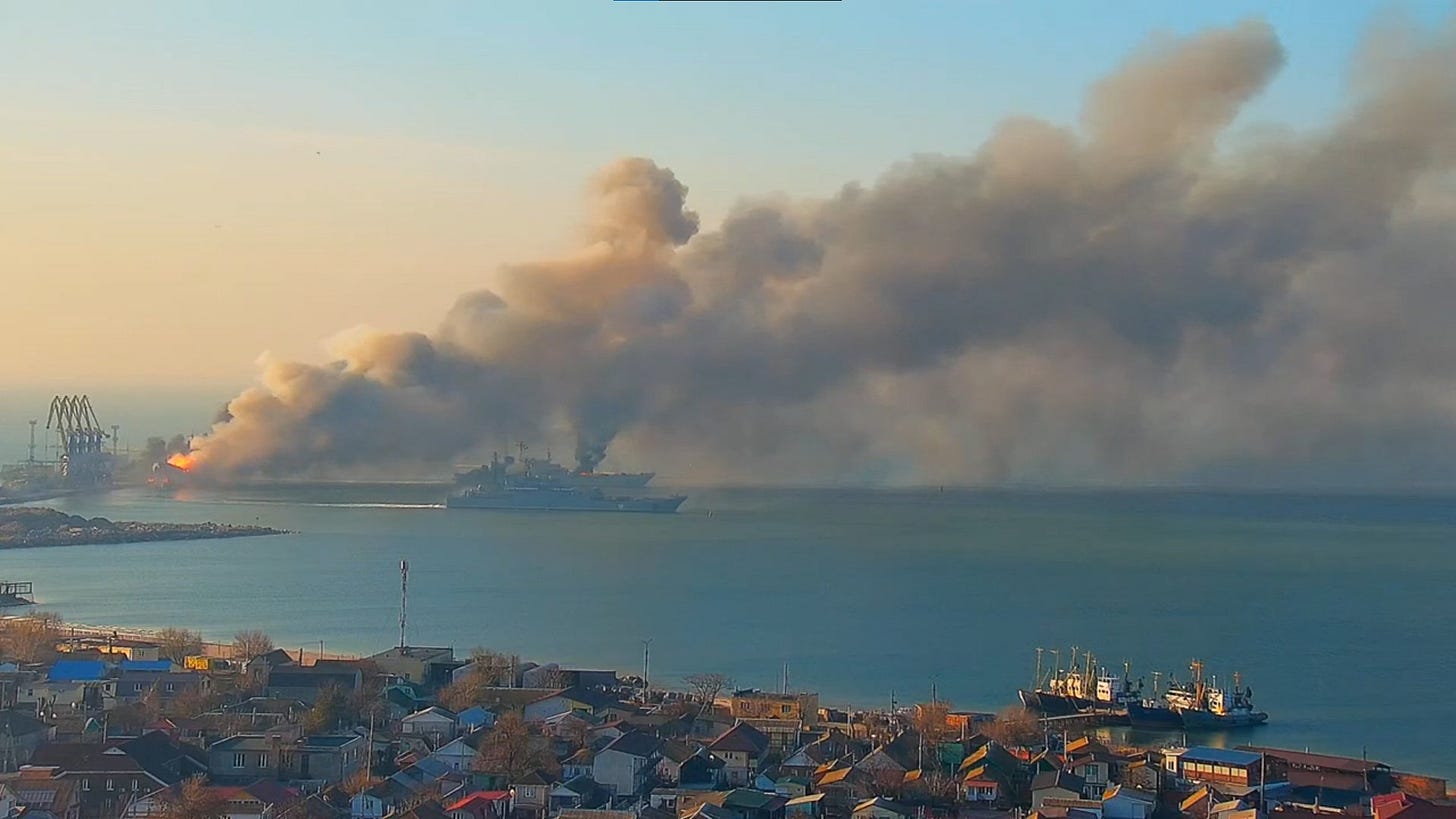
On watching the continuing evolution of the Ukraine conflict there is a consistent theme that seems to be echoed throughout NATO countries — well at least the ones that never were a part of the Eastern Bloc — that nobody is calling for direct confrontation with Russian troops in Ukraine. Well, I guess I am doomed to be ever the contrarian as I am. I’m saying NATO should directly engage in Ukraine.
The general idea of the no-fly zone seems to have this as an issue, well it’s easily solved if we send in ground troops as backup and just accept that’s what we will be doing. Though I honestly doubt given the skill the Ukrainian army has deployed, there would even need to be all that much forward operation of troops.
Now to get through all of my throat clearing. I am not an expert on military tactics, and I don’t plan to write anything at all about how to engage militarily. I will say that given NATO’s logistical capacity, it wouldn’t be too difficult to handle supplying troops in a country that borders two NATO countries and has a functional road system.
This is also based on the assumption that a full deployment of US, British, French, and other NATO air power plus troops and modern weaponry on the ground would be able to beat Russian forces incredibly easily.
Quite frankly my opinion on this has changed 180 degrees in the last month of the conflict. Prior to active engagements, I, like many others, assumed the Ukrainian army stood little chance in a conventional engagement with the fully might of the Russian army, even with western supplied weapons. Through both the incredible tenacity of the Ukrainian forces using their local knowledge to tactical advantages and the sheer incompetence of the Russian forces, it’s clear to me, just as to the rest of the world, that the Russian bear was more of a circus animal trained to roar and intimidate the crowd in a show but without the fundamental fierceness of a wild grizzly.
So what exactly has made me change my mind? Basically the cost-benefit analysis has changed as the cost has drastically lowered and the benefit has increased since the invasion. I remember speaking with a diplomat years ago who explained to me how the theory of diplomacy is easy that you reward friends and punish enemies. The hard part is knowing who is whom. But in this case the world is more united than it has been in 80 years about declaring a state an enemy.
That multilateralism is important because it increases the benefit part of the cost-benefit I mentioned by increasing the pain of a Russian defeat. If Russia can only deal with China, it essentially becomes a client state to its much more powerful neighbor and will get bad deals and increasingly isolated. It’s also unlikely to be allowed much independent power as a client state. Basically, by not allowing things like trade with historically sympathetic Germany, being able to contain Russia now will prevent future conflicts with Russia in the future.
The idea of maintaining the current global order is also massively important. And funny enough, China is probably one of the biggest proponents of territorial integrity, since in their view, Taiwan is a domestic issue. Exactly why a firm Russian defeat would put China into a corner as they want to defend the idea of territorial integrity but also see that invading to retake Taiwan under the control of the PRC would have unacceptably high costs.
But more importantly, the idea that borders matter at all and conquest is unacceptable seems obvious, but it wasn’t even just a century ago. The theory that might makes right is so fundamental to our understanding of societal order that it's disorienting when a bad actor wants to turn the concept on its head. But the idea that big men with guns will eventually show up to enforce vague ideas of how society works is the reason we trust courts. It's the reason we think voting matters. It's the basis of so much we never think about.
We simply cannot allow a rogue actor to disrupt the order that has led to the most peaceful era of human existence. Unfortunately, sometimes peace must be maintained through strength and now that the order that has sustained the world for the last 75 years —including by the USSR— is threatened. In this way, taking Crimea was the real crossing of the Rubicon and this crisis has been slow moving since the Georgia war in 2008, but here we are.
Now for the costs.
Obviously the main cost would be in lives of soldiers lost. It is always an incredibly heavy decision to send people into harm’s way where there will be casualties. But at some point there has to be a calculation of how to minimize deaths. And there is some moral difference between soldiers, fully conscious of the risks involved, and stopping things like bombing of a maternity hospital.
By going and putting an end to this fighting sooner rather than later, we would minimize the amount of suffering. There is a massive difference of military intervention to end a war versus starting one and that little detail often gets overlooked. There’s also the future conflicts not stopping Russia now would invite. The Russian foreign policy has only grown bolder and more dangerous through the 2008 war in Georgia, the 2014 annexation of Crimea and intervention in the Donbass, their incredibly brutal campaign in Syria, and now this. There is a consistent pattern of escalation and we must say “Enough!” at some point.
The other main cost that is worried is the threat of nuclear escalation of two nuclear powers directly engaging each other. The fact is that the threat is massively increased by NOT doing anything.
Mutual Assured Destruction (MAD) is the whole idea that has kept nuclear conflict at bay for decades. The knowledge that if a nuclear strike is launched, then whoever launches it will also be destroyed making the cost of any nuclear war far too high to ever start. The basis MAD working is knowing that your opponent will actually follow through with their threat.
Just as in the Cuban Missile Crisis, the idea that the US was willing do directly take on the USSR —in that case with a naval blockade of Cuba— was able to convince Kruschev that America was serious about responding to the threat and helped to make sure no offensive event happened.
Now I fear the risk of the use of nuclear weapons is increased from NOT intervening for the very same reasons. The Russian government sees hesitation from joining a fight and we could end up in the worst of all worlds where a tactical nuclear weapon is used —on the order of Hiroshima or Nagasaki bombs, but not the massive strategic weapons both sides possess— and lead to a situation with no good outcome for anyone.
It’s also worth noting that the countries most at vulnerable from a large scale escalation —obviously Ukraine, but also Poland and the Baltic States who all directly border Russia— are calling for direct intervention. Poland seems like it may be ready to send troops outside of NATO regardless. A bit of deference to the people with the most skin in the game is probably warranted.
Another cost would be possible Russian retaliation elsewhere or a direct invasion of a NATO country. This seems to be the most easily dismissed worry. They have amassed nearly the entire force of their military to take Ukraine and by all accounts have lost —meaning killed, injured, captured or missing as quite a few soldiers are just abandoning their posts— by best estimates 15-20% of their men in just a month. There’s simply no credible threat that they could actually mount anything like another invasion even if they wanted to now.
To be clear, I absolutely despise the idea of going to war. It’s a terrible option that I’m only for because I think the costs of staying out of it are even worse at this point. A world where conquest for territory gets you an international finger wagging is a much, much less stable world and will lead to far more many wars and human suffering in the future. The unfortunate reality of the world is it sometimes takes violence to prevent violence.
Personal Update
As of this morning, the pup has realized that by barking loud enough he can get into noise-making contests with the downstair neighbor dog. This is the most annoying development in awhile.
In personal news. It’s done, I actually have my Spanish ID and passport in hand so, legally, I’m fully accepted into Spanish society. The whole immigration mess is certainly something and, as I’ve mentioned before, it’s on my list of things to write about.

